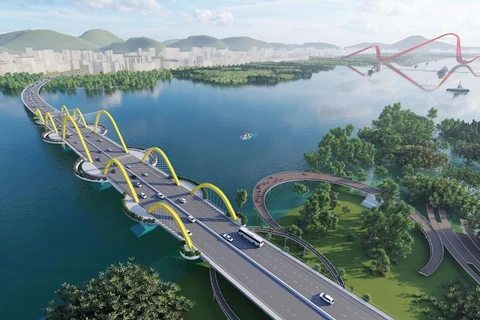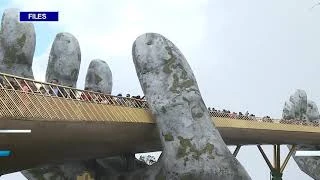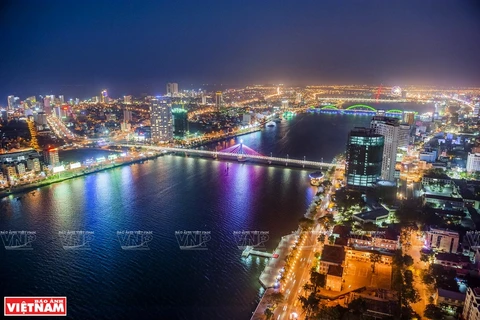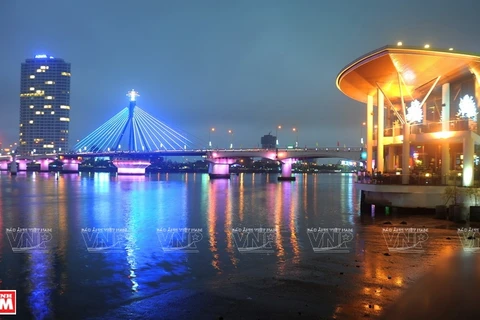 Hoang Van Thu Bridge is located in Hai Phong city, around two hours east of Hanoi. The 1.5-kilometre bridge crossing Cam River was inaugurated in 2019 after three years of construction. The 2.1 trillion VND bridge funded by the municipal budget has helped boost socio-economic development of the northern port city. (Photo: Tran Ming Luong)
Hoang Van Thu Bridge is located in Hai Phong city, around two hours east of Hanoi. The 1.5-kilometre bridge crossing Cam River was inaugurated in 2019 after three years of construction. The 2.1 trillion VND bridge funded by the municipal budget has helped boost socio-economic development of the northern port city. (Photo: Tran Ming Luong)  Cable-stayed Bai Chay Bridge in Ha Long town of the northern province of Quang Ninh, home to world-famous Ha Long Bay, opened to traffic in 2006 after three years of construction. It connects Hon Gai and Bai Chay in Ha Long Town, home to beautiful beaches and luxury resorts.The bridge serves as the main traffic axis of the Hanoi - Hai Phong - Quang Ninh economic triangle that contributes to socio-economic development of the northeast region. (Photo: Tran Ming Luong)
Cable-stayed Bai Chay Bridge in Ha Long town of the northern province of Quang Ninh, home to world-famous Ha Long Bay, opened to traffic in 2006 after three years of construction. It connects Hon Gai and Bai Chay in Ha Long Town, home to beautiful beaches and luxury resorts.The bridge serves as the main traffic axis of the Hanoi - Hai Phong - Quang Ninh economic triangle that contributes to socio-economic development of the northeast region. (Photo: Tran Ming Luong)  Truong Tien Bridge crosses the Huong (Perfume) River in the central city of Hue. Built in 1899 during the reign of King Thanh Thai, the 10th Nguyen Dynasty ruler, the 400-metre bridge was designed by Gustave Eiffel, the architect who designed the Eiffel Tower in Paris and the Statue of Liberty in New York. It has undergone several repairs after damage caused by natural disasters and wartime bombing. (Photo: Tran Ming Luong)
Truong Tien Bridge crosses the Huong (Perfume) River in the central city of Hue. Built in 1899 during the reign of King Thanh Thai, the 10th Nguyen Dynasty ruler, the 400-metre bridge was designed by Gustave Eiffel, the architect who designed the Eiffel Tower in Paris and the Statue of Liberty in New York. It has undergone several repairs after damage caused by natural disasters and wartime bombing. (Photo: Tran Ming Luong)  Designed and built in the shape of a dragon, Rong or Dragon Bridge spanning the Han River is a symbol of Da Nang city in central Vietnam. The bridge, that opened to traffic in 2013, is 666 metres long and 37.5 metres wide and has six lanes. The modern bridge provides the shortest road link from Da Nang International Airport to other main roads in the city, and a direct route to beautiful beaches like My Khe and Non Nuoc on the eastern edge of the city. (Photo: Tran Ming Luong)
Designed and built in the shape of a dragon, Rong or Dragon Bridge spanning the Han River is a symbol of Da Nang city in central Vietnam. The bridge, that opened to traffic in 2013, is 666 metres long and 37.5 metres wide and has six lanes. The modern bridge provides the shortest road link from Da Nang International Airport to other main roads in the city, and a direct route to beautiful beaches like My Khe and Non Nuoc on the eastern edge of the city. (Photo: Tran Ming Luong)  A floating lantern festival on the Hoai River near An Hoi Bridge in Quang Nam Province. The biggest highlight of the ancient town of Hoi An is the lantern festival held on the 14th day of each lunar month, when people gather on An Hoi Bridge to release colorful lanterns onto the river. (Photo: Tran Ming Luong)
A floating lantern festival on the Hoai River near An Hoi Bridge in Quang Nam Province. The biggest highlight of the ancient town of Hoi An is the lantern festival held on the 14th day of each lunar month, when people gather on An Hoi Bridge to release colorful lanterns onto the river. (Photo: Tran Ming Luong)  The 2.75-kilometre-long cable-stayed Can Tho Bridge over the Hau River, the largest tributary of the Mekong, opened to traffic in 2010 after six years of construction. The bridge linking Can Tho City and Vinh Long Province is an iconic symbol of Mekong Delta, Vietnam's agriculture and aquaculture hub. (Photo: Tran Ming Luong)
The 2.75-kilometre-long cable-stayed Can Tho Bridge over the Hau River, the largest tributary of the Mekong, opened to traffic in 2010 after six years of construction. The bridge linking Can Tho City and Vinh Long Province is an iconic symbol of Mekong Delta, Vietnam's agriculture and aquaculture hub. (Photo: Tran Ming Luong)  The 2.75-kilometer-long cable-stayed Can Tho Bridge over the Hau River, the largest tributary of the Mekong, opened to traffic in 2010 after six years of construction. The bridge linking Can Tho City and Vinh Long Province is an iconic symbol of Mekong Delta, Vietnam's agriculture and aquaculture hub. (Photo: Tran Ming Luong)
The 2.75-kilometer-long cable-stayed Can Tho Bridge over the Hau River, the largest tributary of the Mekong, opened to traffic in 2010 after six years of construction. The bridge linking Can Tho City and Vinh Long Province is an iconic symbol of Mekong Delta, Vietnam's agriculture and aquaculture hub. (Photo: Tran Ming Luong)  The first pedestrian bridge in Can Tho city, nearly 200 metres long and 7.2 metres wide, was inaugurated five years ago and is now a popular tourist attraction in the city. (Photo: Tran Ming Luong)
The first pedestrian bridge in Can Tho city, nearly 200 metres long and 7.2 metres wide, was inaugurated five years ago and is now a popular tourist attraction in the city. (Photo: Tran Ming Luong)  Vam Cong Bridge opened to traffic in 2019 after six years of construction and is the second cable-stayed bridge over the Hau River after Can Tho Bridge. It has helped increase connectivity throughout the Mekong Delta while boosting socio-economic development in the region.Vam Cong Bridge stretches nearly three kilometers between Dong Thap Province and Can Tho city. (Photo: VNA)
Vam Cong Bridge opened to traffic in 2019 after six years of construction and is the second cable-stayed bridge over the Hau River after Can Tho Bridge. It has helped increase connectivity throughout the Mekong Delta while boosting socio-economic development in the region.Vam Cong Bridge stretches nearly three kilometers between Dong Thap Province and Can Tho city. (Photo: VNA) VNA























